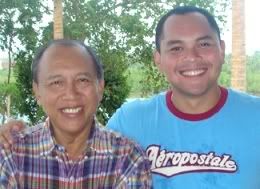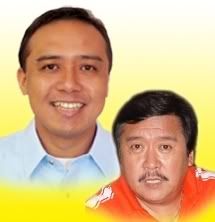Private Lives in Public Eyes
Monday, November 06, 2006
Councilor Jose Fulgencio Del Rosario
Roxas City
Councilor Jose Fulgencio “Pepe” Del Rosario, son of Roxas City Mayor Antonio Del Rosario, fondly remembers his early years growing up with his father. “Everyday is a work day,” he says “and it was quite difficult to compete with his time.” But those years made him understand that the sacrifices were no joke at all.
“Just like any other father, my dad is very protective, conservative, strict and demanding," Pepe says when asked about his father. “He would always make sure that we are safe and well,” Pepe adds. He considers his dad unique compared to others because his dad implements his being strict and demanding in a very malambing (sweet) way. "My dad has a big heart for the people he served for more than half of his life,” Pepe declares.
Mayor Del Rosario involves himself in various advocacies like environmental protection, sustainable development, agriculture, healthcare and education. No wonder Pepe has followed in his father’s political footsteps. Pepe is currently the Roxas City Sangguniang Kabataan (SK) federation President and the National Auditor of the Kabataang Liberal ng Pilipinas (KALIPI). He is now focused on youth education, participation and leadership. In fact, as the SK Federation President, he instituted a scholarship program for poor but deserving students. With all these achievements, he always keeps in mind his father’s advice: “Even diamonds are carved from ugly stones.” “My father would always advise us to respect each person because no matter what their social status is, there is a diamond inside them,” Pepe explains.
John Nico Valencia
Vice President, RGV Real Estate Corporation
Chief of Staff, Office of Rep. Rodolfo Valencia
"My dad is the best father in the world," describes the son of Congressman Rodolfo Valencia, John Nico. “He is my idol, my mentor and most of all my inspiration,” Nico adds.
Congressman Valencia is the Representative of the 1st District of Oriental Mindoro. He previously served as a Governor of the same province for three consecutive terms. He was acknowledged as one of the Ten Outstanding Young Men of the Philippines (TOYM). His advocacies includes urban and community development, agriculture and housing.
Following his father’s path, Nico dedicates much of his time in private and corporate setting. He was is the Vice President on Business Development of the RGV Real Estate Corporation. He also serves as his father’s Chief of Staff.
Proud of his father’s achievements, Nico admires most of all his father’s dedication, passion and time management. “He’s a super workaholic,” he said.
“I urged him to fulfill my dreams,” he says “which is to follow in his footsteps of being a congressman.” At first, his father was against his calling to enter politics. “Because he knows how dirty politics is, and he doesn’t want us to have a controversial life,” Nico explains. But Nico's passion to enter politics prevailed. “It’s God’s will, he has better plans for us,” Nico added, “as long as you’re doing good things the Lord will always guide you and there is a reason for everything.”
When asked about his father’s best advice, he quickly enumerated three important things: set your goal, know your priorities and manage your time.
Nico's ultimate dream for his father is for him to be the President of our country. "He has the experience, dedication and the know-how to solve our economic problems and uplift the lives of our countrymen,” Nico says.
posted by Liberal Party of the Philippines @ 4:29 PM,
,
![]()
![]()
CMP: Assuring Land and Housing for the Poor
Friday, October 13, 2006
By: Atty. Joseph Peter "Jopet" Sison
President, National Home Mortgage Finance Corporation
LP NECO Member
With the onset of urban development in key population centers of the country came the phenomenon of rural migration. In search of jobs and seeing the economic opportunities otherwise not easily available in the countryside, people have moved to the cities and urbanizing areas, bringing in cheap sources of labor and contributing to congestion in these areas. And with the scarcity of residential lands these rural migrants have established colonies of informal settlers in and around the cities and nearby suburbs, on both private and publicly owned lands.
Up to this time, the issue of addressing the land tenure and housing security of these so-called "informal settlers" is as current and relevant as it was decades ago.
Some eighteen years ago, the National Home Mortgage Finance Corporation was privileged to have been among the principal partners, under the stewardship of the Housing and Urban Development Coordinating Council (HUDCC), who have collaborated in coming up with a home financing intervention to address the shelter needs of those considered “the poorest of the poor.”
This preferred home financing solution is called the Community Mortgage Program (CMP). This was anchored on the belief that those living in slums and blighted communities could be enabled and empowered for housing acquisition. By pooling their individual resources and by undertaking to share in the repayment of group or community loans, the homeless low-income earners could afford decent shelter for themselves and their families.
Thus, sometime in 1988, CMP was first launched as an in-house, corporate program of the NHMFC. This was during the time immediately after the EDSA 1 Revolution. The buzzwords then were people power, people empowerment, and the like.
Among others things, CMP was premised on the belief that the urban poor can be “bankable,” and credit-worthy. Contrary to the erstwhile bias against the so-called squatters, CMP will prove later on that these groups of borrowers can be entrusted with a housing loan, and that they will repay their loan.
During the time it was launched, CMP was considered as an innovative loan scheme. A ll other housing loans at that time were granted only to individual borrowers, or up to three tacked-in borrowers for a single loan and a single lot or house and lot, as loan collateral. The loan scheme, however, will not work for the very low-income urban poor, whose individual loan capabilities and loan affordability levels are almost minimal. Moreover, subdividing a parcel of tenanted land to all its occupants and using such individual titles for loan purposes, will add more costs, as to make the loan repayment outside the reach of these prospective housing beneficiaries.
ll other housing loans at that time were granted only to individual borrowers, or up to three tacked-in borrowers for a single loan and a single lot or house and lot, as loan collateral. The loan scheme, however, will not work for the very low-income urban poor, whose individual loan capabilities and loan affordability levels are almost minimal. Moreover, subdividing a parcel of tenanted land to all its occupants and using such individual titles for loan purposes, will add more costs, as to make the loan repayment outside the reach of these prospective housing beneficiaries.
The immediate concern is loan affordability by the CMP borrowers. Once this is assured, the next step is to assure land tenure of those who are informally occupying either government or private lands. The strategy was to pool the individual loan capacities of the home seekers, by organizing them into community association as the CMP borrower. The land occupied or to be occupied by the association members, will serve as the undivided loan collateral. This will stay as a group loan, until after the association decides to subdivide the land and “individualize” the loans to make the loan responsibility those of the individual association members.
The assumption that the primary need of the homeless urban poor is to assure their tenure and ownership of the land is born by the fact that 95% of cumulative loans from 1989 to August 2006 were used for land purchase only. Only a small 5% of said loans was used other than for land acquisition. This is despite the fact that CMP loans may be availed of in three (3) stages – land acquisition; land/site development; and house construction/improvement. This trend may be explained further by the fact that most of the lands purchased using the CMP loans are where the community association members are already situated. Moreover, home improvements are being done on an incremental basis. As additional incomes come in, families introduce or add new improvements.
CMP also capitalizes on the fact that informal settlers, particularly those who have been occupying the land for quite some time, have virtually gained an "implied equity" on the land. The landowner is faced with the fact that the tenanted urban land has depreciated in value. He stands to incur a substantial cost in relocating the land occupants. These costs have worked in favor of the land occupants, such that the landowner after some cost-benefit analysis ultimately decides to sell the land to the occupants at a highly-discounted price.
Another unique characteristic of home lending through CMP is that the loan transaction may only push through when the association of informal settlers agrees to buy the land; and its owner aggresses to sell the property to the association.
More than this, CMP also involves the partnership among the community association of informal settlers as the borrower, the landowner as seller and recipient of the loan proceeds, the local government unit, the non-government organization or people’s organization, and of the government as the loan originator.
The National government serves as the CMP financing agency. In the present case, it is the Social Housing Finance Corporation which is a subsidiary of the NHMFC, currently implements CMP.
As a rule, CMP loans are targeted to borrowers who belong to the lowest 30% of the income population.
Figures show that as of August 2006, the cumulative total of CMP loans reached P6.3 billion, which financed a corresponding total of 1,400 urban poor housing sites nationwide. The cumulative number of beneficiaries totaled 177,277.
posted by Liberal Party of the Philippines @ 10:45 AM,
,
![]()
![]()
Public Service Through Generations
Wednesday, October 11, 2006
It was Mark Twain who said that history doesn’t repeat itself — at best it rhymes. In the Philippines, the historical rhymes of father and son in public service are sounding. Political influence has transcended beyond boundaries, as it tends to cross the sphere of family relations.
Three liberal sons pay tribute to their liberal fathers’ rich legacy of lessons, where values, family, and dedication define public service at its highest and best.
DAVID C. SUAREZ
Vice Governor, Quezon Province
Quezon Vice Governor David Suarez is the proud son of Congressman Danilo Suarez. For years, Vice Governor Suarez has been an advocate of environmental protection, being himself an outstanding local legislator during his early years in public service. He was the former President of the Philippine Councilors League-Quezon Chapter where he sponsored resolutions aiming to protect Tayabas Bay and prohibit illegal logging in Real, Quezon.
“I idolize my dad so indeed he was a great influence in my decision to enter politics,” he says. He believes that his father’s spirit of optimism, sincerity, commitment and genuine love for the country are significant qualities for him to emulate.
Now, as a prominent local legislator for various advocacies like environment protection, agricultural development, youth and sports development, Vice Governor Suarez never forgets his father’s advice. “He taught me that principles and values in politics should not be compromised, but strategies and tactics must be flexible enough to make progress especially under the difficult political decisions we face,” he says. Vice Governor Suarez added that he was inspired by his father’s sense of responsibility to the country and constantly admires his father’s conviction that “everything was doable and the word impossible does not exist.” Vice Governor Suarez says that his father taught him to respect people; to treat even adversaries in life or politics with decency and equal respect. His father also showed him that cooler heads always prevail and to not only see the big picture but focus on the bigger picture.
“And most important never forget to pray,” he added.
For his greatest influence, Vice Governor Suarez dreams that his father further share his legacy with those he has helped and the people who stood behind him in good times and bad and to continue his dedication to help the country, his district and his province, to uplift the lives of his constituents and bring about change and development.
ALLEN G. SINGSON
Mayor, Candon City, Ilocos Sur
The son of Ilocos Sur 2nd District Representative and Deputy Speaker for Central Luzon Eric D. Singson is no stranger to public service. Aside from being the Mayor of Candon City, Allen Singson also serves as the Chairman of the City Anti-Drug Abuse Council (CADAC) and as the Region I Representative for the League of Cities of the Philippines. Being a youth leader way back his college days in De La Salle University, he also handles the Sangguniang Kabataan as an adviser.
Certainly, this is quite a lot of responsibility, but then he has had considerable experience in the field of government, development work and private practice. Growing up with his dad, he gained exposure in public service. He even described it as “growing up with a father of fifteen thousand other brothers and sisters”. Mayor Singson considered his father as a model when he was young. “He is a caring, responsible Dad just like any other regular Dad,” he says, “he is unique in his own way, that he shows it differently from others”. Mayor Singson added that his father’s most admirable quality is his patience and positive outlook. Congressman Eric D. Singson is in his second term as a congressman and is distinguished as one of the Top Ten Outstanding Congressmen in the 13th Congress.
“His advice to persevere and never give up hope,” he says after being asked of his father’s best advice. Mayor Singson wishes that the public and the critics would see, understand and realize that his father “deeply cares for his constituents and his experience can not be replicated.”
As a proud son, his dream for his father is to “rise higher in his current post to that which he really deserves to attain.”
EMMANUEL L. MALIKSI
Vice Mayor, Imus, Cavite
Perhaps the hardest thing for a son to endure is seeing his father’s dignity be ruined by lies and allegations. No doubt, Emmanuel “Manny” Maliksi has gone through it all. It can be remembered that Erineo “Ayong” Maliksi, Vice Mayor Maliksi’s father and the current Governor of Cavite, was suspended after serious charges of abuse of authority and misconduct. Vice Mayor Maliksi stood behind his father as he faced the greatest challenge in his public service career. He never lost his faith and fondly remembered his father’s words, “Panindigan mo and bagay na papasukin mo.”
“He always motivates me to give my best and would say that I can make it and don’t give up.” Vice Mayor Maliksi described his father as a disciplinarian, good provider and family oriented. “He’s really devoted to be a public servant,” he added, “he puts his heart into his calling.” Ironically, his father dissuaded him to enter politics. “Ayaw niyang punasok ako sa politics,” he said. Still, Vice Mayor Maliksi followed his calling. He is now serving as the Vice Mayor of Imus, Cavite and the Presiding officer of the Sangguniang Bayan—the legislative body of the local government of Imus, and is committed to enacting ordinances, approving resolutions and appropriating funds for the general welfare of the municipality and its inhabitants.
For Vice Mayor Maliksi, his father’s most admirable quality is his patience. He believes that his father’s patience made him what he is today. During his term, Cavite was cited for having attained the highest human development index by the United Nations Development Program.
posted by Liberal Party of the Philippines @ 3:23 PM,
,
![]()
![]()
Liberal Party
Address
4/F J&T Tower, 3894 Ramon Magsaysay Blvd., Sta. Mesa, Manila
Contact Us
7158505, 7157040, 7130737
liberalparty.ph@gmail.com
The Liberal Online
Editor-in-Chief
Robert Anthony RamosBlog Master
Donna Babadillaliberalpartyphilippines@gmail.com






